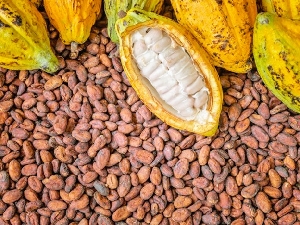Cocoa plunged by the most ever — slumping as much as 27% in just two days — with price swings becoming more extreme as fewer investors and companies can afford to maintain trading positions.
Futures slid as much as 13% in New York on Tuesday, before paring some of the loss, after tumbling the previous day by the most in data going back to 1960. The retreat marks a stark turnaround from earlier this month, when prices soared to a record above $11,000 a ton due to a historic supply crunch, raising the cost of making chocolate.
Even with the recent pullback to the lowest in a month, cocoa has still roughly doubled since the start of the year. The rally made it more expensive to keep positions and prompted investors to close out trades, which has drained liquidity and made the market more vulnerable to large price swings.
Cocoa’s rally had made it more expensive than copper, and the big question was how far prices could reach. Pierre Andurand, a hedge-fund manager best known for his oil wagers, bet on higher cocoa prices ahead of the massive recent surge. He forecast futures to break $20,000 this year.
The magnitude of the recent drop was a surprise, though the declines could prove brief because the fundamental picture hasn’t changed, said Fuad Mohammed Abubakar, head of Ghana Cocoa Marketing Company UK Ltd., a subsidiary of the country’s regulator.
“The market action in the last three days goes to show the fall is always easier and faster than the climb,” he said.
Harvests in West Africa have been battered by crop disease and poor weather this season, putting the world on track for a third straight supply deficit and forcing both Ivory Coast and Ghana to roll forward supply contracts. The amount paid to farmers there is also well below the global market prices, making growers less able to invest in plantations and boost production.
Lower prices would offer some relief to chocolate makers, who have seen costs soar and have been scouring the world for cocoa beans. Shares of Barry Callebaut AG, which supplies some of the biggest consumer chocolate brands, climbed as much as 6.6% on Tuesday. Lindt & Spruengli AG’s stock also rose.
Maintaining Positions
Cocoa’s advance this year has meant traders — including those who’ve hedged against physical holdings — have had to come up with more money to pay margin calls, which work as an insurance policy to cover potential losses. When they can’t do that, they’re forced to close out positions. That has helped push down open interest, or the number of outstanding contracts, curbing liquidity.
Looking forward, the end of the El Nino weather phenomenon could help harvests recover next year, Marijn Moesbergen, sourcing lead at Cargill Inc., said at the recent World Cocoa Conference in Brussels. Prices may have overshot and the market needs to find a new equilibrium between supply and demand, he said.
Business News of Tuesday, 30 April 2024
Source: bloomberg.com
Cocoa extends slump in London and New York, dropping by 27% over the past two days
Business
















